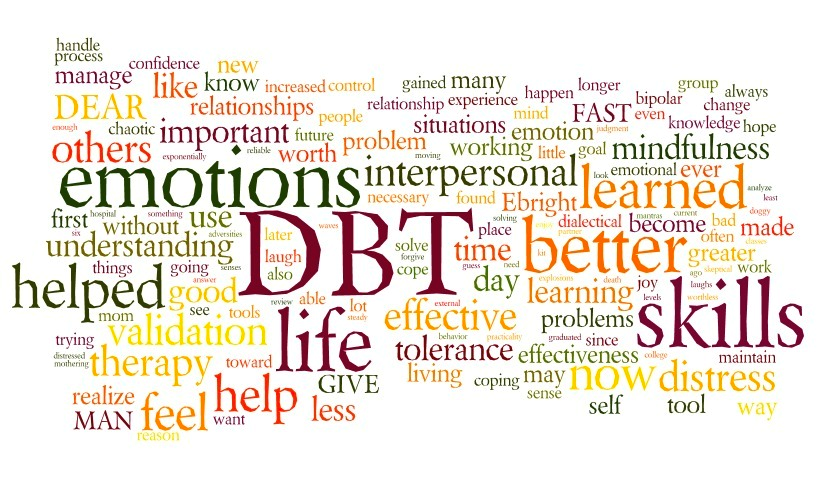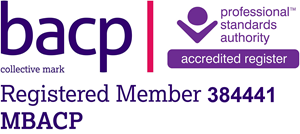I was thinking about my time in therapy this morning and how strong and resolute I’ve become all with your help! II can’t believe how far I’ve come !
Thank you so much, I couldn’t have done this without you.
I currently provide DBT to individuals and groups. I work with private clients, with organisations, – particularly where DBT has been mandated by court or other referral agency. Contact me for further information.
If you struggle with any of the following, Dialectical Behavioural Therapy (DBT) can help:

DBT was developed by Dr Marsha Linehan at the University of Washington to help people who struggled with Borderline Personality Disorder (BPD), often known as Emotionally Unstable Personality Disorder (EUPD). This is often characterised by impulsive behaviour, self-harm, difficulty in interpersonal relationships and intense emotional fluctuations.
Initially recognised as the gold standard in treating those with BPD/EUPD, DBT has now proven to be more effective than traditional therapy in treating a range of issues that have difficulty in regulating emotions at their core.
DBT is a specialist Cognitive Behavioural Treatment and skillset designed for people who experience difficulties in managing or regulating their emotions, who may have found unhealthy ways of coping such as alcohol or drugs.
DBT uniquely helps us change behaviours whilst accepting that ongoing difficulties will arise.
The focus is on helping you to learn effective coping strategies:
It is a mode of therapy that can be useful for those experiencing loss or emotional distress as well as those having difficulty with anger, isolation, relationship conflict, chaotic relationships, mood swings, or impulsive behaviours.
DBT emphasises creating a life you want to live.
Extensive research has shown that DBT skills can be applied successfully in treating conditions such as eating disorders, working with trauma self harm and addictions. The premise of DBT is that it is interactive. The therapist will do 50% of the work and the client undertakes to match this with 50% work and effort.
Throughout the therapy you are supported and encouraged to apply DBT concepts and skills to your own life.
You will be provided with worksheets, resources and short videos to be downloaded (or viewed online) and to aid your learning.
———————————————————————————————
What does “dialectic” mean in DBT?
The dialectic in DBT refers to two seemingly opposite things being true at the same time.
For example, if you accept yourself and believe you are doing the best you can, you can also believe that you need to make changes.
https://www.sciencedirect.com/science/article/abs/pii/S1077722922000438
To be effective, you will be invited to work through the modules in an interactive way, bringing your own examples to each DBT session.
1 Core Mindfulness and walking the Middle Path consists of regular sessions specifically designed to teach you how to increase your awareness levels, decrease reactivity so you learn to respond rather than react, and deal with self-judgments and judgements by others.
This module will help you:
It will also teach you how to avoid:
It will help you to acknowledge the validity of different positions and others’ perspectives.
2 Distress Tolerance module is centred on accepting difficult situations and emotions whilst finding ways to survive and tolerate the moment without the need to resort to or engage in old, unhealthy, or problematic behaviours.
It equips you with the skills to manage addictive thinking and behaviours:
This module is especially helpful for relapse prevention in addiction.
3 Emotion Regulation involves learning to recognise and label current emotions, identify obstacles to changing emotions, reduce emotional vulnerability and reactivity.
It helps us increase positive emotions and learn how to change emotions that are unhelpful or unwarranted.
4 Interpersonal Effectiveness teaches strategies for asking for your needs to be met, saying what you need, saying no – saying what you don’t need.
You learn about setting boundaries and coping with interpersonal conflict in a way that influences others whilst enhancing the relationship and your own self-respect.
It teaches strategies for maintaining balanced relationships. It teaches us how to manage difficult relationships, build new healthy ones, and how to end draining or toxic relationships.
DBT provides a comprehensive set of practical skills to help you manage your emotions, change destructive behaviors and create a life with less suffering and more possibilities for contentment and joy.
The therapy is structured around your goals and we will prioritise the things in your life that you most want to change.
If you are in Standard DBT treatment, meaning you are in both individual DBT therapy and are participating in a DBT Skills Group, you will have access to phone skills coaching between sessions from your individual therapist to help you use the DBT skills when you most need them.
I am a qualified Counsellor and Psychotherapist, trained in London, educated to Masters Degree level, and a professionally registered member of the BACP (British Association of Counselling and Psychotherapy).
Originally, I worked in Behavioural Healthcare Science and Organisational Psychology as a Public Health Academic, lecturing and researching at Newcastle University Medical School and on the University of Durham MBA Programme. As a result, I have authored numerous academic papers on changing health behaviours, and have several high ranking publications in these fields of study.


I have worked across several organisations including the NHS, Prison Services, Community Drug and Alcohol Services, charitable and private agencies, and private rehab clinics.
I have also been a key member of Heal for Life over the past five years which helps clients heal from trauma and abuse. More recently, I have been featured on TV’s ‘The Woman Show’ live as an invited expert, answering questions and giving support on sexual issues and sex addiction.
Currently, I do sessional work in London City & Greater London, Tynemouth (NE30), Newcastle upon Tyne, and Online.
Also, I have specialist expertise in:
I have worked as a successful academic in the field of behaviour change with several high ranked publications. Practising within a humanistic and psychodynamic perspective, I am trained in group therapy, Dialectical Behavioural Therapy and one-to-one therapy. I also have a specialist interest in behaviour change, addiction and trauma.
Educated to Masters Degree level, and I hold individual membership with the British Association for Counselling and Psychotherapy (BACP)
Jacqueline Colligan https://www.instagram.com/jacq_colligantherapist/
Addiction Actually https://www.facebook.com/AddActually
Dialectical Behavioural Therapy https://www.facebook.com/DialecticalTherapy
Jacqueline M. Colligan (biz page) https://www.facebook.com/JacqColligan
Find out if therapy can help you.
I was thinking about my time in therapy this morning and how strong and resolute I’ve become all with your help! II can’t believe how far I’ve come !
Thank you so much, I couldn’t have done this without you.

Thank you so very much for all of your hard work. You are an incredible therapist and an inspirational, exceptional and influential person.

Wishing you a very Happy New year and thank you for being a major influence in reigniting my recovery , I really mean that.

Just wanted to say sorry I didn’t get to see you before you left. It was a real pleasure working with you. You have a great way of working with clients
Hopefully our paths will cross sometime best of luck in the future.

I highly recommend Jackie in many ways as a professional, and also as a person- while dedicated to her work with deep seriousness her vibrant personality and, mindfully used by Jackie only when appropriate, wonderful sense humour makes Jackie a joy to be around

After many years, 30 plus in fact of crippling addiction, an addiction that escalated to many life-threatening experiences, I finally surrendered to the powerlessness of my situation and reached out for help.
I was incredibly fortunate to find Jackie. Jackie became my focal therapist in residential rehabilitation.
I spent many months under the care of a person who worked tirelessly to unravel my troubled mind.
To say that I am eternally grateful doesn’t begin to do justice to someone who literally kick-started the process of saving my own life.
I can’t recommend Jackie highly enough.
Four years of blissful sobriety later, I am living my best life now, and whilst it hasn’t always been easy, we do recover.
Please just ask for help as I did and you could also begin a fantastic new path with Jackie’s guidance

Jackie, you were a massive part of my early recovery and a source of inspiration to this day.

I saw Jackie under sufferance, as penance perhaps for a failed suicide attempt. Years of alcohol and medication abuse, chronic insomnia, anxiety and numerous other challenges from the psychotherapist handbook. I spent a year with her, once a week being guided to understand the events that made for such a chaotic and dysfunctional life. Once that was done, Jackie armed me with the tools to step forward and recognise the signs which would have me step back. I owe her more than perhaps modesty would have her realise. An outstanding counsellor who always knew when I was dodging the issue.

Firstly to thank you for all the incredible help over the last four weeks. I’ve learnt so much about myself and my behaviours in my sessions with you, and I leave with a lot of learnings and tools.
Thanks again Jackie, I will never be grateful enough to you,for your insight and support.
